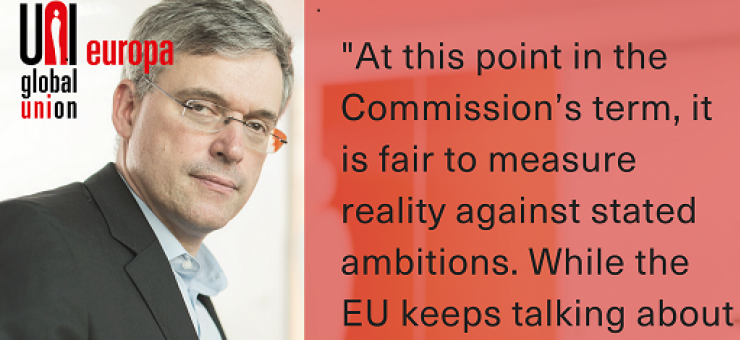News
An AAA-rated society for workers’ rights

This European Commission promised progress on social issues, but so far none has materialised. Europe’s workers need job security, well-defined right and a fair standard of living, writes Oliver Roethig on Euractiv.
AAA-rated countries have an exceptional degree of creditworthiness as they are trusted to meet their commitments with ease. Two years ago, Commission President Jean-Claude Juncker said he wanted the EU to achieve a “social AAA” rating. He made this statement on a very symbolic occasion: the day the members of his Commission were approved by the European Parliament.
One year later, he announced in his 2015 State of the Union speech his desire to develop a European “Pillar of Social Rights” to complement and improve existing achievements in protecting EU workers.
Halfway through the Commission’s term, it is fair to measure reality against ambitions. By any objective credit standard, the European social rating still has junk status. Workers find it hard to believe that Europe will live up to its social commitments.
While the Commission increasingly talks about Social Europe, its activities go in a different direction, particularly on workers’ rights. The promise on balance between flexibility for companies and worker protection has been broken, creating an overwhelming impression of an EU too skewed towards the interests of big business – workers, trade unions and citizens come a distant second.
One case in point that is of great importance to over a million European workers, most of them young women, is health and safety standards in the hairdressing industry. Hairdressers face much higher risks of skin diseases and occupational asthma, and routinely work with chemicals known to be carcinogenic. But for close to five years, the Commission has refused to take action, ignorantly pretending the social partners just want to regulate the size of hairdressers’ high heels and mocking potentially life-threatening health and safety concerns as “a small thing”.
Likewise, the Commission’s 2017 Work Programme does not inspire confidence for services trade unions. Juncker and his right-hand man Frans Timmermans continue to treat labour issues as secondary, “small” things and despite “relaunching” social dialogue in 2015 there is still a lack commitment to the role of social partners.
The proposed European Pillar of Social Rights must address the importance of the services sector, which is at the core of European societies and economies. The sector employs 70% of European workers and generates 70% of Europe’s GDP. Policymakers and influencers tend to concentrate on high-skill export manufacturing. This is important but is the icing on the cake, not the cake itself. When we talk about the labour market, we are by and large talking about services workers.
Technological change is turning the labour market inside out. Globalisation, the negative effects of digitalisation, zero-hour contracts and project-based work competed for in digital hiring halls have been around for many years – some are just old-fashioned capitalist techniques distilled into a smartphone app and made hip with terminology like “sharing economy”. But the fact is that digitalisation hits service sector workers hard, in particular those in the mid-skill and mid-salary range.
That is why it is a particular concern for UNI Europa that the Commission is preparing a draft on insolvency and company restructuring that threatens to damage hard-won workers’ rights. Our sector knows from bitter experience how tactical insolvencies are used by employers to destroy these rights and leave workers high and dry.
UNI Europa, along with the ETUC, believes the Pillar of Social Rights will be a way of getting Europe back on track, but only if it provides a credible promise of hope for working people. The EU’s ambition must be for working life once again to provide a positive and predictable future, based on fairness, progress and social safety. We need a broad and large working class that is not in a precarious working and living situation. We need a Europe where social and employment rights take precedence over unrestricted capital.
The Pillar of Social Rights must lead to a real and substantive social action programme encompassing legislation, policymaking mechanisms and financial resources. It must:
promote trade union and collective bargaining rights at national level and with multinational companies;
proactively address the labour dimension of digitalisation in order to guarantee a just transition for workers;
ensure that employers cannot evade national and EU obligations towards their employees and that governments cannot dilute workers’ rights;
include social partners in the entire decision-making process at the EU and national levels;
substantively increase EU investment programmes with a focus on creating quality jobs and fostering a general pay rise in Europe;
reform social security systems to provide decent living standards for all, including workers in non-standard forms of employment.
If President Juncker, Vice-President Timmermans and the rest of the European Commission are prepared to have a serious conversation about what European Pillar of Social Rights we need to build for the 21st century, the trade unions are ready and waiting.
Find the opinion piece on Euractiv

